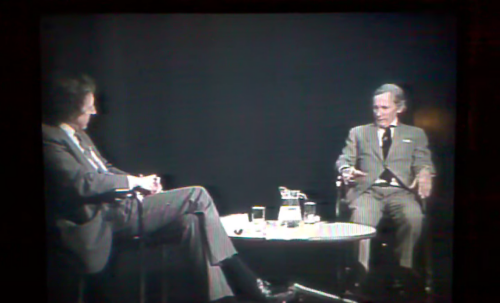I have to say it's not a genre I have ever been interested in as a rule.... perhaps because, as you say, by the time I was old enough to consider watching such a thing, the heyday was long since gone.
In general, when I see things such as Letterman (is that the kind of thing you mean or is he some sort of more general non-entertainer in many fields rather than specialising in a single one ie chat?) I always find the interviews a curious mixture of smugness and discomfort. I´m just sort of thinking out loud here but perhaps that arises from the way that the situation is on the one hand, a wholly artificial one, but one which at the same time we have all become entirely accustomed to so we no longer notice that characteristic. I always feel uncomfortable FOR the people in that situation, both presenter and guest, it feels a little like when at a party or other social event two people are introduced by a mutual acquaintance who promptly disappears leaving the others to sort of... well, what? Normally to make their excuses and extricate themselves to talk to their real friends as quickly as politeness allows... but for our unfortunate tv people that's not an option, they have to remain in that situation with the stranger for a specified amount of time, and they have to do it with loads of people watching and expecting to be entertained. I mean of course it's not so frightening as I make out cos, just as in a party with loads of strangers, there are some that thrive more than others, and luckily the ones we are watching are those ones who are deemed to be the very greatest of such thrivers.
But I think that's the source of my instant dislike of the format, before we even get down to the content, I find it a strangely and unpleasantly high pressure situation. I've only just realised it myself but I guess when watching this sort of thing I am having that same kind of feeling one gets watching stand up comedy, willing them desperately to succeed and be funny, not so that they entertain me, but just so that they avoid the unfathomable horror of dying on stage. I guess I am not huge fan of stand up anyway, but the very thought of going to something like that and watching someone fail horribly and then freeze up on stage is just too horrible to contemplate.
As for the content, I think that there is an issue with the fact that the interview is bound to be short and shallow and concerned almost entirely with promoting the guest's latest filmbookthing, maybe this was less the case in the good old days, I dunno, it certainly wouldn't surprise me to learn that the conversations themselves have tended to get shorter and shallower over the years, with more guests on the sofa at the same time, making quick jokes and ensuring that nothing of real depth is ever addressed. The only exceptions being those ones where there is some kind of breakdown; Tom Cruise jumping on the sofa, Grace Jones hitting the emu, Serge Gainsborug telling Whitney Houston he'd like to fuck her etc they're certainly the ones people remember.
I´m always surprised by the popularity of these things in the US an the importance that people seem to ascribe to them. The question being not "do you watch these things?" but "which one do you watch?" and I've seen huge and bemusingly serious debates about how great Leno or Letterman is at that thing they do, whatever it is.

